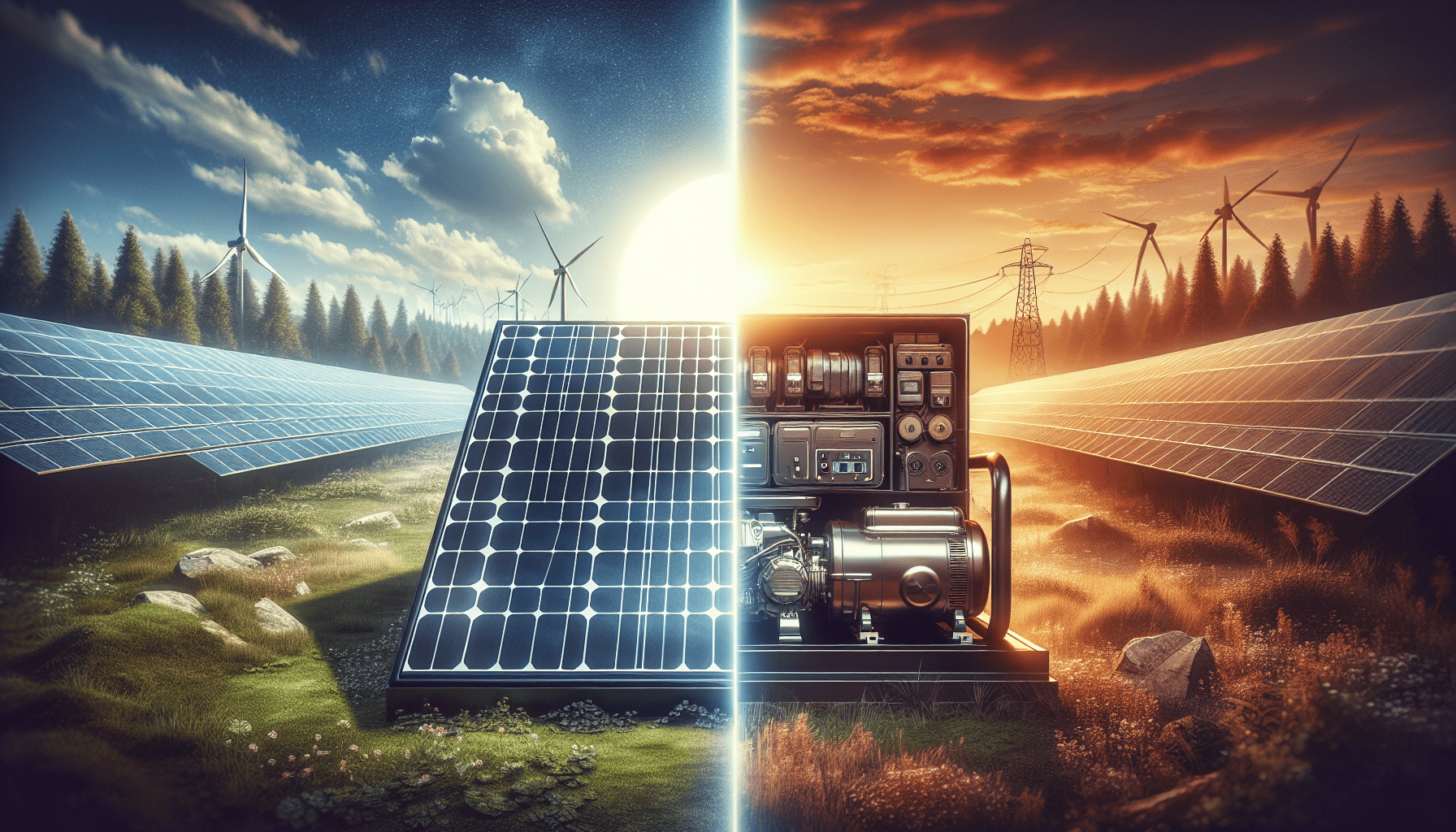Solar Batteries vs. Generators: Choosing the Best Backup Power Solution
As an Amazon Associate, I earn from qualifying purchases, at no additional cost to you. Disclaimer
Have you ever found yourself in the middle of a power outage, pondering how to keep your home running smoothly until the lights come back on? It’s a common dilemma, and one that brings us to a fascinating debate: solar batteries versus generators. Both of these backup power solutions have their own merits and drawbacks, making the choice between them no small feat. In this discussion, I’ll walk you through the ins and outs of each option, aiming to help you make the best choice for your needs.
Click Here to Go Solar and Save
Understanding Your Backup Power Needs
Before diving into the specifics of solar batteries and generators, it’s essential to assess your individual backup power requirements. Understanding your needs will guide your decision in selecting the most suitable power backup solution for your situation.
Assessing Your Power Usage
The first step in choosing a backup power source is to determine how much power you actually need during an outage. Consider which appliances and systems are crucial for your comfort and safety. Details like how many lights you need, whether you require a refrigerator running, or if you have medical devices that need uninterrupted power will help you better understand your baseline energy needs.
Duration of Power Outages
How long do outages typically last in your area? If power interruptions are usually short-lived, investing in a solution with a higher capacity may not be necessary. However, if you’re in a region prone to extended outages, you’ll want a backup system that can sustain its power output over a longer duration.
Budget Considerations
Budget is a crucial factor in your decision-making process. Solar battery systems generally have a higher initial cost but can save money in the long term through energy savings. Generators, on the other hand, might be cheaper upfront but could incur higher operating costs due to fuel expenses.
Solar Batteries: Clean and Renewable Backup
Solar batteries are an environmentally friendly option known for their renewable energy source. They store energy harnessed from the sun, providing a sustainable solution. Here, we’ll explore some of their features, advantages, and potential drawbacks to give you a comprehensive understanding.
How Solar Batteries Work
Solar batteries operate by storing energy collected from solar panels during daylight hours. This stored energy can be used on-demand, providing power even when the sun isn’t shining. Essentially, they allow you to save the excess energy your solar panels produce for later use, such as during nighttime or power outages.
Advantages of Solar Batteries
Environmental Impact
Solar batteries are a clean power source, meaning they produce zero emissions during operation. By utilizing solar energy, you’re contributing to a reduction in carbon footprints, which is a significant consideration for those concerned with environmental protection and sustainability.
Quiet Operation
One of the delightful aspects of solar batteries is their silent operation. Unlike generators, they don’t produce noise, ensuring that your home remains a tranquil space even during a power outage.
Energy Independence
Investing in solar batteries can lead to increased energy independence. With your own power supply, you are less reliant on the grid, which can protect you from fluctuations in energy prices or supply disruptions.
Potential Drawbacks of Solar Batteries
Initial Cost
The upfront cost of solar batteries can be quite high. Although prices have been decreasing as technology advances, the initial investment remains substantial, which might be a barrier for some homeowners.
Weather Dependency
Solar batteries rely on sunlight, so their effectiveness may vary with weather conditions. On cloudy or rainy days, the amount of energy harvested can decrease significantly, affecting the stored energy levels.
Capacity Limitations
The storage capacity of solar batteries might not suffice for homes with very high energy demands. For those with substantial energy needs, multiple batteries or supplementary systems might be necessary.

Click Here to Power Your Home with Solar
Generators: Reliable and Conventional Power
Generators have been a staple in backup power solutions for decades. While they might not boast the newest technology, they have proven reliable over time. Let’s explore their advantages, operation, and the potential downsides to consider.
How Generators Work
Generators produce electricity through the combustion of fuel, such as propane, natural gas, or diesel. When the grid power fails, the generator kicks in to provide a continuous power supply, keeping your home’s essentials running.
Advantages of Generators
High Power Output
Generators are particularly known for their ability to deliver large amounts of power, making them suitable for households with extensive energy needs or for businesses that require consistent power availability.
Versatile Fuel Options
With varying fuel options, you can choose a generator that operates using the fuel most readily available to you, such as propane or natural gas. This flexibility can be a practical solution, depending on your location and access to resources.
Cost-Effectiveness
In terms of upfront costs, generators typically present a more affordable option compared to solar battery systems. For those looking at immediate budget constraints, generators might provide a more feasible solution.
Potential Drawbacks of Generators
Noise and Emissions
Generators can be noisy, which might be disruptive in residential communities. Additionally, they produce exhaust emissions, contributing to air pollution, which may be a concern for environmentally-conscious individuals.
Maintenance and Fuel Storage
Generators require regular maintenance to ensure optimal performance and reliability. Moreover, the storage of fuel can pose safety risks if not handled properly, and it may also be costly over time, depending on prices and availability.
Non-renewable
As generators typically rely on fossil fuels, they do not offer the same environmental benefits as solar batteries. The use of non-renewable resources can add to your carbon footprint, something many people are trying to minimize.
A Comparative Analysis: Solar Batteries vs. Generators
To make the best decision suited for you, a direct comparison of solar batteries and generators can reveal which option aligns better with your needs and values. Consider the following aspects:
| Aspect | Solar Batteries | Generators |
|---|---|---|
| Upfront Cost | Higher | Lower |
| Operating Cost | Lower (no fuel costs) | Higher (ongoing fuel costs) |
| Environmental Impact | Low (clean energy) | High (emissions) |
| Noise Level | Silent | Noisy |
| Dependence on Weather | Yes | No |
| Maintenance | Low | High |
| Energy Source | Renewable | Non-renewable |
| Power Output | Variable (depends on capacity) | High (consistent) |

Click Here to Discover Solar-Powered Solutions
Choosing the Right Solution for You
After exploring both options, how do you make the best choice? Here are some considerations to guide your decision.
Evaluate Your Priorities
Reflect on what matters to you most. Are you more concerned with environmental impacts, or is the cost your primary focus? Perhaps reliability during extended outages takes precedence. Knowing your priorities will clarify which features matter most in a backup system.
Consider Blending Solutions
For some, a hybrid approach makes sense. Using a solar battery system to cover smaller outages and a generator for longer durations might provide a balanced solution to meet different demands while reaping the benefits of both technologies.
Think About Future Needs
Consider how your energy needs may evolve. Are you planning to expand your home, or do you project changes in your power usage? Flexibility for future expansion and adaptability should factor into your decision-making process.
The Conclusion
Selecting the right backup power option involves careful consideration of multiple factors, from environmental impacts to cost implications. Each solution offers unique advantages. Whether you opt for the technological innovation of solar batteries or the time-tested reliability of generators, your choice should reflect your values, needs, and future aspirations. Understanding these considerations can lead to a decision that ensures your home remains a haven of comfort, no matter the power status outside.

